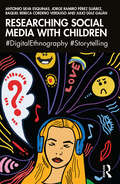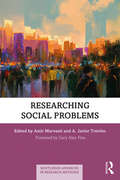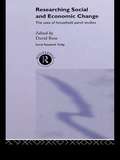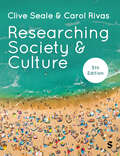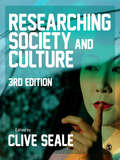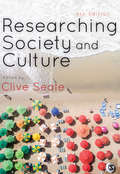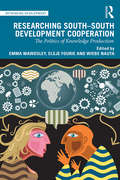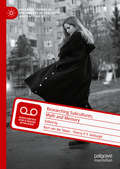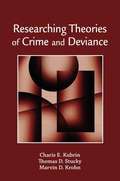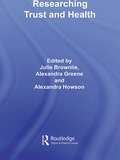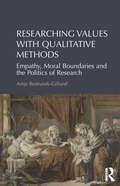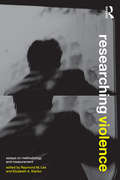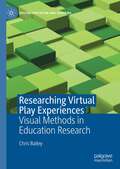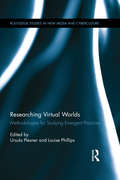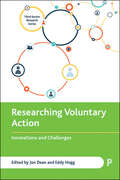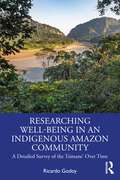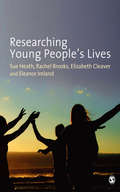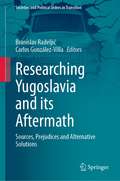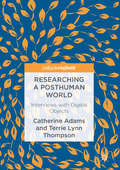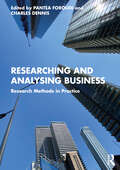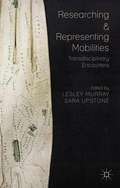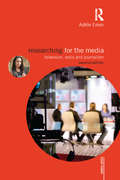- Table View
- List View
Researching Social Media with Children: #DigitalEthnography #Storytelling
by Antonio Silva Esquinas Jorge Ramiro Pérez Suárez Raquel Rebeca Cordero Verdugo Julio Díaz GalánReflecting on the methodological issues involved in researching digital spaces with children, this book shares good practices and delves into the ethics of such research.Social media has completely redefined how children and young people relate to each other, express themselves, and present their identities and sexualities. Yet researching social media can be a difficult and daunting task given the ephemerality of the content, its contextual hyperspecificity, the complex power relationships between users, celebrity culture, digital capitalism, and the ethical issues that arise from the reimagining of the public/private space. Using digital ethnography and creative digital storytelling workshops with children and young people aged 13-15 and 13-18 on TikTok, Instagram, and Twitch, this book studies their interactions, language, codes, the risks they take, and the victimizations they suffer.Researching Social Media with Children will be of use to social scientists conducting online research, and to students and scholars of media studies, digital criminology, psychology, and sociology.[The authors draw on experiences from studies carried out in Spain on children and social media by the Knowledge-Research Group on Social Problems at Universidad Europea de Madrid.]
Researching Social Problems (Routledge Advances in Research Methods)
by Amir Marvasti A. Javier TreviñoThis book covers a wide range of contemporary methods for researching social problems and connects these approaches to the broader substance and theories of social problems. Expository and discursive in approach, chapters follow a uniform structure, with each offering research examples and a broad description of the related method and its theoretical context, together with a "how-to" guide for applying that method using substantive examples from the field of social problems. For every method explored, there is a research example that fully reviews and illustrates the application of the particular method, before giving a full assessment of the method’s strengths and weaknesses and latest developments. With chapters exploring survey interviews, in-depth interviews, narrative inquiry, institutional ethnography, participatory action research, auto-ethnography, Actor-Network Theory, experimental research, visual research methods, and research ethics, Researching Social Problems will appeal to scholars and students of sociology and politics working in the fields of research methods and social problems.
Researching Social and Economic Change: The Uses of Household Panel Studies (Social Research Today Ser. #Vol. 12)
by David RoseIn this user-friendly introduction, European and American experts in the field join forces to explain what panel studies can achieve and to illustrate some of the potential pitfalls in the construction and analysis of panel data. Household panel studies provide one of the most significant national and international resources for analysing social and economic change. This is an essential and accessible introduction for those contemplating the use of panel studies for the first time and will be an invaluable resource for both practising researchers and the commissioners of research.
Researching Society and Culture
by Clive Seale Carol RivasJust starting out with social research? With contributions from experts across the social sciences, this book equips you with the tools for successfully investigating society and culture. It shows you how to prepare for research, generate and analyse data, and present your findings. Balancing theory with practice, it covers foundational concepts in methods and methodology alongside contemporary developments. This radically updated new edition: Sees all chapters fully rewritten in a friendly, accessible style; Offers additional chapters on participatory research and online ‘big’ data; Includes multiple case studies of real-world research from across the globe in every chapter; Celebrates the dynamic, reflexive nature of research as engagement with the world.
Researching Society and Culture
by Clive Seale Carol RivasJust starting out with social research? With contributions from experts across the social sciences, this book equips you with the tools for successfully investigating society and culture. It shows you how to prepare for research, generate and analyse data, and present your findings. Balancing theory with practice, it covers foundational concepts in methods and methodology alongside contemporary developments. This radically updated new edition: Sees all chapters fully rewritten in a friendly, accessible style; Offers additional chapters on participatory research and online ‘big’ data; Includes multiple case studies of real-world research from across the globe in every chapter; Celebrates the dynamic, reflexive nature of research as engagement with the world.
Researching Society and Culture
by Clive SealeClear, coherent and trusted this book is the perfect guide to the main social research methods in use today. The much anticipated third edition of Clive Seale's bestselling title further expands its coverage to provide an authoritative introduction to all of the social research methods used to analyze qualitative and quantitative data. Written by internationally renowned experts, every chapter is packed with real world examples, student-friendly learning aids and helpful practical tips. Highlights of this edition include: - New chapters covering: research design, sampling, structured data collection, preparing data for statistical analysis, coding and analysing qualitative data, narrative analysis and interpretive phenomenological analysis (IPA), giving oral presentations, writing a research report and content and comparative keyword analysis - A much expanded glossary now boasting more than 500 definitions - A re-modelled and expanded website containing lecturer PowerPoint slides, extra chapters not included in the book and downloadable journal articles - Revised student exercises, workshops, review questions and key words An invaluable, practical resource this book is an essential companion for every undergraduate and postgraduate student starting a methods course or social research project.
Researching Society and Culture
by Clive SealeWritten by internationally renowned experts, each chapter provides a full introduction to a key aspect of research methodology. From starting out to generating, analysing, and presenting data, this new edition covers foundational concepts in social research while also keeping students on the pulse of topics like digital social research, social surveys, and big data. Packed with international examples from across the social sciences, it shows how to interpret and work with data generated from real-world research. It gives you the tools to: - Design the right research question for your project - Access, understand, and use existing data - Effectively write up projects and assignments - Be confident in the A to Z of the research process Supported by an interactive website with videos, datasets, templates, and additional exercises, this book is the perfect hand-holder for any social science student starting a methods course or project.
Researching Society and Culture
by Clive SealeWritten by internationally renowned experts, each chapter provides a full introduction to a key aspect of research methodology. From starting out to generating, analysing, and presenting data, this new edition covers foundational concepts in social research while also keeping students on the pulse of topics like digital social research, social surveys, and big data. Packed with international examples from across the social sciences, it shows how to interpret and work with data generated from real-world research. It gives you the tools to: - Design the right research question for your project - Access, understand, and use existing data - Effectively write up projects and assignments - Be confident in the A to Z of the research process Supported by an interactive website with videos, datasets, templates, and additional exercises, this book is the perfect hand-holder for any social science student starting a methods course or project.
Researching South-South Development Cooperation: The Politics of Knowledge Production (Rethinking Development)
by Emma Mawdsley Elsje Fourie Wiebe NautaOver the last two decades the expanding role of Southern countries as development partners has led to tectonic shifts in global development ideas, practices, norms and actors. Researchers are faced with new questions around identity, power and positionality in global development. Researching South-South Development Cooperation examines this rapidly growing and complex phenomenon, asking to what extent existing assumptions, conceptual frameworks and definitions of 'development' need to be reframed in the context of researching this new landscape. This interdisciplinary book draws on voices from across the Global South and North to explore the epistemological and related methodological challenges and opportunities associated with researching South-South development cooperation, asking what these trends mean for the politics of knowledge production. Chapters are interspersed with shorter vignettes, which aim to share examples from first-hand participation in and observation of South-South development cooperation initiatives. This book will be of interest to anyone conducting research on development in the Global South, whether they are a practitioner or policy maker, or a student or researcher in politics, international development, area studies, or international relations.
Researching Subcultures, Myth and Memory (Palgrave Studies in the History of Subcultures and Popular Music)
by Bart van der Steen Thierry P. F. VerburghThis book brings together contributions that analyse how subcultural myths develop and how they can be studied. Through critical engagement with (history) writing and other sources on subcultures by contemporaries, veterans, popular media and researchers, it aims to establish: how stories and histories of subcultures emerge and become canonized through the process of mythification; which developments and actors are crucial in this process; and finally how researchers like historians, sociologists, and anthropologists should deal with these myths and myth-making processes. By considering these issues and questions in relation to mythmaking, this book provides new insights on how to research the identity, history, and cultural memory of youth subcultures.
Researching Theories Of Crime And Deviance
by Marvin D. Krohn Charis E. Kubrin Thomas D. StuckyMany textbooks provide summaries and critiques of criminological theories, which are often supported by empirical evidence. However, this evidence is only as good as the research methods that were used to generate it. Where do these "facts" come from, and how reliable are they? <p><p> Researching Theories of Crime and Deviance offers a critical evaluation of the research methods that generate data, bridging the gap between theory and research in the study of crime and deviant behavior. This unique resource challenges students to carefully appraise--rather than blindly accept--the research techniques that are used to produce theories and scholarship. <p> In clear and engaging language, noted criminologists Charis E. Kubrin, Thomas D. Stucky, and Marvin D. Krohn assess the various research methods that have been used to test nine theoretical perspectives of crime. As they examine the processes and challenges of conducting theoretically directed research, the authors focus on sampling, measurement, and analytical issues. <p> A dynamic and compelling text, Researching Theories of Crime and Deviance demystifies the research process, encouraging students to become better informed readers and researchers. It serves as an excellent resource for criminological theory courses, graduate-level research methods courses, and seminars that take a close look at the development of criminological theory and/or methods.
Researching Trust and Health (Routledge Studies in Health and Social Welfare)
by Alexandra Howson Julie Brownlie Alexandra GreeneThere is currently a lively debate ongoing in society about the nature of trust and the conditions necessary to establish and sustain it. Given the role of trust in bridging uncertainty, it is perhaps not surprising that as our consciousness of risk has increased, the role and nature of trust in social practices has come under growing scrutiny. These developments are particularly relevant to health because participation in health practices is arguably based on and engendered through trust. There is thus a need for empirically based research, which intelligently unravels this complexity to support all stakeholders in the health arena. This multidisciplinary volume of work addresses this gap by contributing substantively to the exploration of trust in the experience, practice and organization of health. It offers an overview of recent scholarship, based on empirical research, which explores the significance of trust in relation to key health-related issues. At the same time, this text examines conceptual themes in relation to trust more generally, including the relationship between trust and auditing, consent, expert knowledges and social capital.
Researching Values with Qualitative Methods: Empathy, Moral Boundaries and the Politics of Research
by Antje Bednarek-GillandIn several branches of social science, interest in values and moral evaluations has increased in recent years, with group values taking centre-stage, yet a satisfactory, theoretical account of the concept of values and their role in social life remains lacking. Engaging with theories of value formation and the role of values in everyday life found in ethics, classical sociology and contemporary social theory and their implications for empirical work, Researching Values with Qualitative Methods argues for a pragmatist approach both to understanding values and the manner in which they are formed, as well as exploring the ways in which they can be studied empirically, using qualitative research methods. In this way, this book promises to resolve many of the practical problems involved in fieldwork with political groups, including the prominent question of how to account for the researcher's own values. Illustrated with examples from published as well as new research, this book provides the foundation for the theoretical understanding of values and their empirical investigation, thus strengthening the connection between social theory and the development of research methods. As such, it will be of interest to sociologists, anthropologists and geographers with interests in values, social theory and research methodology.
Researching Violence: Methodology and Measurement
by Elizabeth A. Stanko Raymond M. LeeViolence is a research topic that is fraught with difficulties. A notoriously sensitive subject, and one that is presumed to be largely hidden, researchers have long struggled with the question of how to measure its impact and how to explore its incidence. Arising from the ESRC's Violence Research Programme, Researching Violence is a practical guide both to theses problems and to the obstacles encountered when negotiating this uneasy terrain. Comprising the reflections of researchers who have worked on diverse projects - from violence in the home to racial violence and homicide - this book demonstrates the ingenuity and at times courageous actions of researchers having to think on their feet. It also investigates the ethical and emotional issues arising from working with the victims and perpetrators of violence. This book will be indispensable for students and academics doing research projects on violence.
Researching Virtual Play Experiences: Visual Methods in Education Research (Digital Education and Learning)
by Chris BaileyThis book illuminates the lived experience of a group of primary school children engaged in virtual world play during a year-long after-school club. Shaped by post-structuralist theory and New Literacy Studies, it outlines a playful, participatory and emergent methodological approach, referred to as ‘rhizomic ethnography’. This ‘hybrid’ text uses both words and images to describe the fieldsite and the methodology, demonstrating how children’s creation of a digital community through Minecraft was shaped by the both the game and their wider social and cultural experiences. Through the exploration of various dimensions of the club, including visual and soundscape data, the author demonstrates the ‘emergent dimension of play’. It will be of interest and value to researchers of children’s play, as well as those who explore visual methods and design multimodal research outputs.
Researching Virtual Worlds: Methodologies for Studying Emergent Practices (Routledge Studies in New Media and Cyberculture)
by Louise Phillips Ursula PlesnerThis volume presents a wide range of methodological strategies that are designed to take into account the complex, emergent, and continually shifting character of virtual worlds. It interrogates how virtual worlds emerge as objects of study through the development and application of various methodological strategies. Virtual worlds are not considered objects that exist as entities with fixed attributes independent of our continuous engagement with them and interpretation of them. Instead, they are conceived of as complex ensembles of technology, humans, symbols, discourses, and economic structures, ensembles that emerge in ongoing practices and specific situations. A broad spectrum of perspectives and methodologies is presented: Actor-Network-Theory and post-Actor-Network-Theory, performativity theory, ethnography, discourse analysis, Sense-Making Methodology, visual ethnography, multi-sited ethnography, and Social Network Analysis.
Researching Voluntary Action: Innovations and Challenges (Third Sector Research)
by Jon Dean and Eddy HoggThe first book of its kind, this volume brings together a range of experts to review key methodological issues in the study of voluntary action, charitable behaviour and participation in voluntary organisations. Using case studies from around the world – from ethnography to media analysis and surveys to peer research – chapters illustrate the challenges of researching altruistic actions and our conceptualisations of them. Across different fields and methods, authors unpick the methodological innovations and challenges in their own research to help guide future study. Demystifying research and deepening our ability to understand the role of the third sector, this accessible book is suitable for social researchers at all levels.
Researching Well-Being in an Indigenous Amazon Community: A Detailed Survey of the Tsimane' Over Time
by Ricardo GodoyThis book aims to provide the first comprehensive, multi‑year, systematic, quantitative assessment in the behavioral sciences of how well‑being changes over time in a small‑scale rural society of Indigenous People in the Global South.Using data compiled by the Tsimane’ Amazonian Panel Study (2002–010) that monitored change in Tsimane’ communities, this book analyzes economic, social, and health changes in a farming and foraging society of native Amazonians in Bolivia. It uses multidisciplinary methods to follow the same individuals, households, and village through time and bring together three themes: well‑eing, economic inequalities, and the fate of Indigenous People in small‑cale rural societies of the Global South. It finds considerable material deprivation, high economic inequalities within Tsimane’ society, and declining standards of living over time It ends by asking “Is this evidence that people adjust to anything or are these the costs Tsimane’ pay to retain autonomy and follow a historical lifestyle?”This book aims to provide a comprehensive approach to the measurement of well‑being and how to track its changes, providing a platform for future generations to gauge long‑term change. It will resonate with undergraduate and graduate students across the behavioral sciences, professional anthropologists who specialize in the Amazon or well‑being, development economists, and senior researchers who are part of the wave of emerging interest in doing research in small‑scale rural societies of the Global South.
Researching Young People′s Lives
by Elizabeth Cleaver Eleanor Ireland Rachel Brooks Sue Heath′Researching young people′s lives will be useful to both the novice researcher and anyone interested in learning about new methods of practice′ - Youth Studies Australia Researching Young People′s Lives provides an overview of some of the key methodological challenges facing youth researchers and an introduction to the broad repertoire of methods used in youth-orientated research. The book is split into two sections. In the first half of the book, the authors consider the broad methodological and contextual concerns of relevance to the design and conduct of youth research, including ethical issues, the importance of context, and the rise of participatory approaches to youth research. The second part of the book focuses on the use of specific research methods in the conduct of youth research, ranging from surveys and secondary analysis through to interviewing, ethnography, visual methods, and the use of the internet in youth research. Throughout the book, the emphasis is on research in practice, and examples are drawn from recent youth research projects from a wide range of disciplines and substantive areas, and from a range of both UK and non-UK contexts. This is an ideal introduction to the field for novice researchers, in particular students studying and researching in the broad area of youth studies. It should also appeal to practitioners engaged in evaluation of service provision to young people, and to established youth researchers who might wish to explore the potential of using a different set of methods to those with which they are already familiar.
Researching Yugoslavia and its Aftermath: Sources, Prejudices and Alternative Solutions (Societies and Political Orders in Transition)
by Branislav Radeljić Carlos González-VillaIn Researching Yugoslavia and its Aftermath, a common thread is the authors’ path through the time and space context in which fieldwork has taken place. Accordingly, this collection tackles problems that have always existed but have not been dealt with in a single volume. In particular, it examines a range of methodological questions arising from the contributors’ shared concerns, and thus the obstacles and solutions characterising the relationship between researchers and their objects of study. Being an interdisciplinary project, this book brings together highly regarded historians, sociologists, anthropologists, political scientists, cultural and social theorists, as well as experts in architecture and communication studies. They share a belief that the awareness of the researcher’s own position in fieldwork is a precondition of utmost significance to comprehend the evolution of objects of study, and hence to ensure transparency and ultimate credibility of the findings. Moreover, the contributors come from diverse backgrounds, including authors from the former Yugoslavia and others who have made their way to the region after starting their research careers; some from universities in the area, others from institutions in the Global North. Here, they explore cross-cutting issues such as the repercussions of gender, nationality, institutional affiliation and the consequences of their entry into the field. This is examined in terms of the results of the research and the ethical aspect of the relationship with the object of study, as well as the implications of the chosen time framework in the methodological design and the clash between this decision and the interests of the actors studied.
Researching a Posthuman World
by Catherine Adams Terrie Lynn ThompsonThis book provides a practical approach for applying posthumanist insights to qualitative research inquiry. Adams and Thompson invite readers to embrace their inner - and outer - cyborg as they consider how today's professional practices and everyday ways of being are increasingly intertwined with digital technologies. Drawing on posthuman scholarship, the authors offer eight heuristics for "interviewing objects" in an effort to reveal the unique - and sometimes contradictory - contributions the digital is making to work, learning and living. The heuristics are drawn from Actor Network Theory, phenomenology, postphenomenology, critical media studies and related sociomaterial approaches. This text offers a theoretically informed yet practical approach for asking critical questions of digital and non-digital things in professional and personal spaces, and ultimately, for considering the ethical and political implications of a technology mediated world. A thought-provoking and innovative study, this book will be of great interest to scholars and researchers of technology studies, digital learning, and sociology.
Researching a Posthuman World: Interviews with Digital Objects
by Catherine Adams Terrie Lynn ThompsonThis book provides a practical approach for applying posthumanist insights to qualitative research inquiry. Adams and Thompson invite readers to embrace their inner – and outer – cyborg as they consider how today’s professional practices and everyday ways of being are increasingly intertwined with digital technologies. Drawing on posthuman scholarship, the authors offer eight heuristics for “interviewing objects” in an effort to reveal the unique – and sometimes contradictory – contributions the digital is making to work, learning and living. The heuristics are drawn from Actor Network Theory, phenomenology, postphenomenology, critical media studies and related sociomaterial approaches. This text offers a theoretically informed yet practical approach for asking critical questions of digital and non-digital things in professional and personal spaces, and ultimately, for considering the ethical and political implications of a technology mediated world. A thought-provoking and innovative study, this book will be of great interest to scholars and researchers of technology studies, digital learning, and sociology.
Researching and Analysing Business: Research Methods in Practice
by Charles Dennis Pantea ForoudiResearching and Analysing Business: Research Methods in Practice provides an accessible and practical guide to various data collection and data analysis techniques within management, from both quantitative and qualitative perspectives. This key resource functions as a comprehensive reference tool – covering a broad variety of methodologies – examining both the theory behind them and their application in practice. These include systematic literature review through bibliometric and meta-analysis, secondary vs primary sources, qualitative research vs quantitative research, combining qualitative and quantitative methods, qualitative and quantitative research method approaches, fsQCA, data mining, and sentiment analysis. Chapters are rich in examples, data sets, practical exercises, easy-to-follow slides, and a glossary, which help readers to understand and apply research approaches as well as to assess the strengths and weaknesses of each method. Unique in its practical approach and with insights from active researchers, this book is required and recommended reading for advanced undergraduate and postgraduate students studying research methods as a core module within business and management courses. It is also a useful tool for PhD students and academics within the discipline. Online support materials include PowerPoint slides.
Researching and Representing Mobilities: Transdisciplinary Encounters
by Sara Upstone Lesley MurrayThis book explores mobile representations in government policy, literature, visual arts, music, and research and examines the methodological potential of these representations and the ways in which representations co-produce mobilities.
Researching for the Media: Television, Radio and Journalism (Media Skills)
by Adele EmmResearching for the Media: Television, Radio and Journalism is an essential guide to researching for the media industry. It explains the role of the researcher and journalist within radio, television and journalism exploring key areas of what to expect in the job. Researching for the Media: Television, Radio and Journalism offers advice and instruction on practical, ethical and legal issues which affect anyone working in these industries. Beginning with suggestions on how to think up ideas and how to devise treatments, through to general research methods and techniques and guidance on working on location at home and abroad, it uses real examples of good and bad practice from the industry. Written by an experienced researcher, writer and producer, Researching for the Media includes: Tips on finding contributors from contestants, experts and specialists through to audiences and celebrities How to find photographs, picture and film clips and the ethical and legal issues involved Advice on finding and using music and copyright issues How the media uses the internet and social media such as Twitter, Facebook, Instagram A discussion of risk assessment, codes of conduct, ethical behaviour and legal and safety issues A glossary of media terms, further reading and a list of helpful websites. Discover more at www.adeleemm.com
